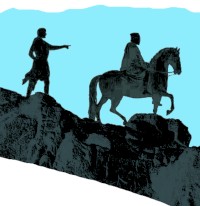From his Account of the Attempts To Build A Town At The Mouth of the Musselshell River
Of the sources for Liver-eater history all four agree with the tone and specifics of the battle between woodchoppers, wolfers, whiskey runners and a party of Sioux, one of whom had part of his lever eaten in public by John Johnson at battle’s end. Of the commentators, Bradley is the most scrupulously accurate in details, with the exception that he refers to Johnson’s act of ritual cannibalism in the following manner, “The wounded Indians left upon the field were at once dispatched, and the bodies scalped and in one case otherwise shamefully mutilated…”
This man was so disgusted by Johnson that he did not even credit him with the infamous act, considering it an embarrassment that a white behaved in such a fashion.
Bradley’s account has numerous compressed adventures outlined in pertinent detail, with his generalizations and omissions confirming the other accounts.
Of particular interest is his sketch of Indian politics, rivalries and interaction with the whites at the settlement. One example must be revealed on this Fourth of July 2016:
The Sioux Indians, who in their various bands, bedeviled the settlers and waged almost constant warfare on whites and other tribes in this contested confluence of the Musselshell and the much larger Missouri rivers. The warriors had noticed that a party of whites came to a site and continued work on a basement at the same time every day and lay in wait for them there on the night of July 2. However, little did the warrior know that today was “the whites’ great medicine day.” The Sioux party stayed in the basement all day while the whites across the river got drunk, until finally one man, Mister Halvor Olsen, crossed the Musselshell River and was fired upon by the Indians, who missed him and fled, leaving one of their men behind dead. The body was brought to town, tied to a log and rolled in the river.
Bradley closes the account like so:
“The patriotism of the cellar diggers saved their lives, and it is seldom that a better argument is presented for the observance of our great national holiday.”











